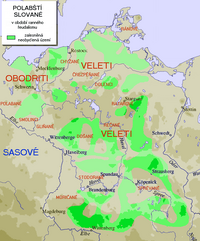| Polabian | ||
|---|---|---|
| General information | ||
| Countries |
File:Flag of Germany.png Germany | |
| Status |
extinct since the 18th century | |
| Language family |
Indo-European
| |
| Political information | ||
| Group of speakers | ||
| Language codes | ||
| ISO 639-1 |
None | |
| ISO 639-2 |
| |
| ISO 639-3 | ||
Polabian is an extinct Lechitic language spoken among the Polabian Slavs (German: Wenden) in present-day Germany near Elbe River. It was spoken until about the 18th century when it was superseded by the German language in Mecklenburg-Vorpommern, Brandenburg (Mittlemark) and Saxony-Anhalt, as well as in Lower Saxony and Schleswig-Holstein. In the south, it border the Sorbian population in Lusatia.
The language was, in some respects, markedly different from other Slavic languages. It was closely related to the neighboring Pomeranian and Kashubian languages, and only attested in a very small number of manuscripts, dictionaries, and other writings from the 17th and 18th centuries. As can be seen in the comparisons of the Lord's Prayer below, Polabian contained a number of German loanwords, such as Wader (father) and Rîk (kingdom).
History

Former settlement areas of the Polabian Slavs.
Only about 2800 Polabian words are known today, from prosaic writings, a few prayers, one wedding song, and a few folktales. Immediately before Polabian's extinction, several people began collecting phrases, compile wordlists, and were engaged in folklore of the Polabian Slavs, but only one of these people appears to have been a native speaker of the language, leaving 13 pages of linguistically important material from a 310-page manuscript.[1] The last native speaker of Polabian, a woman, died in 1756, and the last person who spoke limited Polabian died in 1825.
The most important monument of Polabian is the so-called Vocabularium Venedicum (1679–1719) by Christian Hennig.
The language left some traces in current toponymy; for example, Wustrow "Place on the island", Lüchow (Polabian: Ljauchüw), Sagard, Gartow, etc. It is also likely that the name of Berlin may have originated from the Polabian stem berl-/birl- meaning "swamp".
Grammar
Phonology

|
This page or section incorporates Creative Commons Licensed content from Wikipedia (view authors). |
For Polabian, the following segments are reconstructable:[2]
|
|
|
|
| Bilabial | Labiodental | Dental | Alveolar | Palatal | Post-palatal | Velar | ||||||
|---|---|---|---|---|---|---|---|---|---|---|---|---|
| Plosive | p | b | t | d | t' | d' | k | g | ||||
| ṕ | b́ | |||||||||||
| Affricate | c | ʒ | ć | ʒ́ | ||||||||
| Fricative | f | v | s | z | š | ś | ź | x́ | x | |||
| - | v́ | |||||||||||
| Nasal | m | n | ń | |||||||||
| ḿ | ||||||||||||
| Lateral | l | |||||||||||
| ĺ | ||||||||||||
| Trill | r | |||||||||||
| ŕ | ||||||||||||
| Semi-vowel | j | |||||||||||
Morphology
![]() This section is empty. You can help Languages Wiki by adding to it.
This section is empty. You can help Languages Wiki by adding to it.
Syntax
![]() This section is empty. You can help Languages Wiki by adding to it.
This section is empty. You can help Languages Wiki by adding to it.
Lexis
![]() This section is empty. You can help Languages Wiki by adding to it.
This section is empty. You can help Languages Wiki by adding to it.
Dialects
![]() This section is empty. You can help Languages Wiki by adding to it.
This section is empty. You can help Languages Wiki by adding to it.
Example
References
- ↑ Kapović (2008, p. 109)
- ↑ Cited after Kazimierz (1993, p. 799)